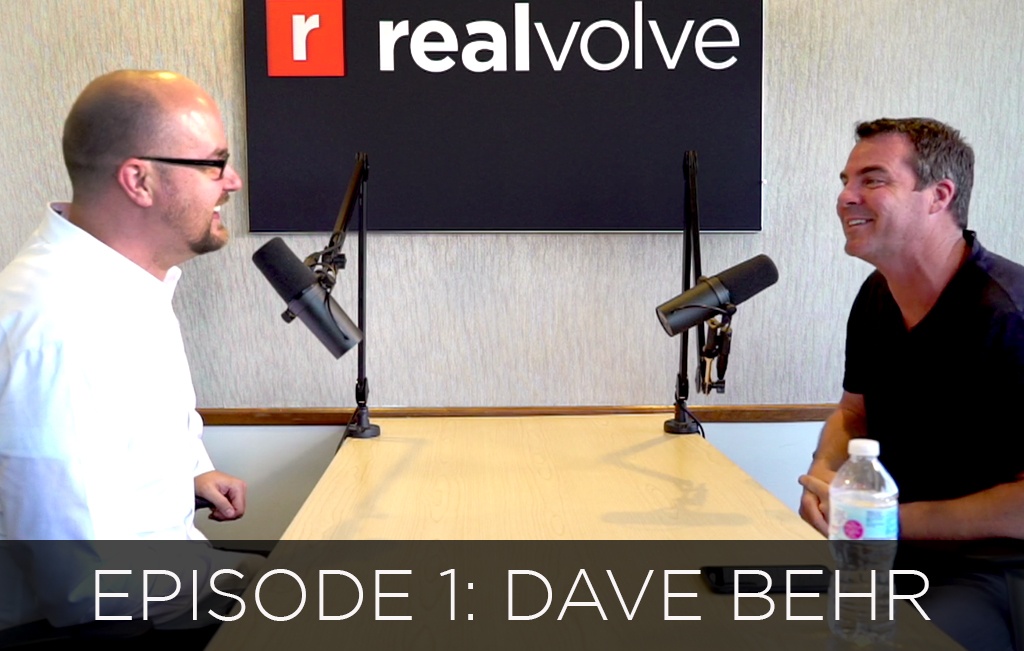Meet Dave Behr, formerly the “Speaker in the Sneakers,” today the “Lender You Can Learn From.” As a loan consultant and a real estate coach, he embraces his passion for teaching agents how to differentiate, build trust, and close more sales.
In this podcast, Dave talks about:
- The Sales Hallway Concept, and eliminating objections
- The impact of telling your story (instead of your company’s story)
- Why trust, not the sale, should be your goal
Enjoy!

Listen now on iTunes

Listen now on Stitcher
Dale: What’s up, Dave?
Dave Behr: Doing awesome. Doing unbelievable, actually.
Dale: Doing unbelievable?
Dave Behr: Yeah. Covers you either way, doesn’t it?
Dale: It does.
Dave Behr: Good or bad.
Dale: Good or bad. It’s unbelievable.
Dave Behr: Yes, sir.
Dale: The funny thing I was just thinking about, just coming up the stairs after I grabbed my water, is when I met you, I was known as the…what, the IT guy? I think that’s what they called me around the office.
Dave Behr: Right. With the glasses.
Dale: I was Dale the IT guy. Back when I did internet marketing, around the office they called me IT. You and I were both in the speaking industry. I dipped my toe in. You were all the way in. I was on the managerial side, and you were a speaker and a promoter.
Dave Behr: Yes.
Dale: Tell us about that. Where’d you come from?
Dave Behr: 1995, I had an opportunity to get introduced to Tom Hopkins, the great sales trainer.
Dale: The great Tom Hopkins.
Dave Behr: The great Mr. Legend Tom Hopkins, yes.
Dale: Yeah. In the last couple of years, I think Tom Hopkins’s fame has waned a little bit, but Tom Hopkins is no joke. Thirty-five-some years top bestseller, How to Master the Art of Selling. It’s still to this day my favorite sales book.
Dave Behr: Yeah. I did door-to-door sales in college, so I funded my way through school knocking doors. I knocked a hundred thousand doors in four years. The funny thing is, I picked up his book to get some strategies in which to stay motivated, but the thing I loved about Tom Hopkins is his nuts-and-bolts, skills-based teachings. It’s nice to get motivated, but he had, you know, “Here’s what to say, here’s how to say it.” I loved that. I still use some of his information today.
But yeah, I spent about seven years with him after college, and then after that I kind of went out on my own and promoted a lot of different speakers and did a lot of speaking myself, so… Yeah. That’s a good run.
Dale: Yeah, it was a good run. So you’re no longer the speaker in the sneakers. What’s Dave Behr doing these days?
Dave Behr: Well, I think we need to clarify “speaker in sneakers.” I don’t know if they’re going to think I’m crazy or not, but I think it’s important that you stand out in an overcrowded marketplace. I had a goal to be one of the best speakers in the world, and I realized there’s a lot of stiff competition out there, so I decided I was going to be the greatest speaker in sneakers.
I threw on a pair of Chuck Taylor tennis shoes with my suit, and everywhere I’d go I would get lots of reactions. Some people didn’t like it, some people loved it, but everybody remembered it. I think that’s the key to being successful in an overcrowded marketplace—being memorable.
Dale: It’s like branding yourself.
Dave Behr: Yeah, of course. I certainly got a lot of dirty looks, but there were a lot of people who really liked it, especially after I spent some time with them. Then they’d go, “Okay, this makes sense,” so it was good.
Dale: I think it’s popular now. A lot of people do it now, but back then you had to have polish on your shoes to be taken seriously.
Dave Behr: Right. I was ahead of my time.
Dale: Yeah. Nice. So what are you doing now?
Dave Behr: Well, after 25 years of traveling around the country, living in almost every major city in the United States…
Dale: Some multiple times, right?
Dave Behr: Yes, correct. I promised my wife—now we have three kids: Max is going into first grade, and Cole’s going to be in kindergarten, and then we have a two-year-old—I promised once the kids were of school age that we would settle down in one city, so we decided on Denver, Colorado.
I decided, after thinking about it long and hard, that the mortgage business was going to be for me, because I’m entrepreneurial, and I liked the fact that I could run my own business but not actually pay the bills like I had been, which is kind of nice. I wanted to continue to do training, so I thought, what industry could I get into that training would be a benefit?
There’re a lot of lenders out there, so the question was: what could I do different? I thought I’d capitalize on my skill set of training and sharing ideas—and the fact that I loved doing it. My passion for training, I didn’t ever want to give that up. But I didn’t want to be the traveling dad on the plane all the time, so I decided on the mortgage industry, and I’m out there giving as much value as I can to realtors. I’m not asking for their business—I’m trying to attract the business by giving first, being service-oriented.
The word “deserve” in Latin means “from service.” My mother was a social worker growing up. That’s all I knew: to serve, to help, to give a helping hand. For me, it’s a piece of me that I can’t let go—to help and serve others—so it seemed like a good fit. I’m enjoying it so far. It’s been a good challenge here in my first year, but I’m up for it. I’m excited.
Dale: It’s June right now. It’ll be July by the time this is out, 2018. You’re six months in or so.
Dave Behr: Yes.
Dale: You’re like restarting your professional career.
Dave Behr: Yeah.
Dale: Probably a lot of people listening to this podcast have done something very similar, especially a lot of residential real estate agents. This is their second, third, fourth, or fifth career.
What stands out to you now that you’re six months in? What’s different than you were expecting about the industry?
Dave Behr: I feel like…the timing that I got into it. People are telling me, “Oh my god, it’s so tough out there right now. It’s a crazy market.” I just thought that was normal. I’m happy to know that that’s not the normal, but I’ve kind of stepped in at a time that supposedly is tough. Anyone and everyone who can stay consistent, stay the course, and just keep going because you know why you’re doing what you’re doing—once we get through this, it should be a piece of cake.
Dale: Yeah.
Dave Behr: I’m excited to know that that wasn’t the normal, so to speak, but there are more people shopping around than I thought there would be. I think a lot of that maybe has to do with the fact that the relationships I have currently with realtors aren’t super, super strong. I’ve got a couple, but the referrals aren’t, “Hey, trust this guy.” You know? Instead, it’s a Zillow lead that gets thrown to me. Then I have to go through that, and then they’re shopping three different people. I’ve been dealing with price and rates, and I think that’s going to be in any market.
Dale: Sure.
Dave Behr: There are certainly strategies in which you cannot wait for the objection, but must eliminate the objections. One of the speakers I promoted, Weldon Long, teaches a really neat concept on how to eliminate objections so you don’t have to overcome them. I’ve been sharing that with a lot of realtors around the country, and they really seem to appreciate it.
Dale: That’s the sales hallway concept?
Dave Behr: Correct. I’ve learned many ways to overcome objections over the years, and as we’re progressing through the transitions of how sales is now vs. how it was before, I love his concept of not waiting for the objection. Eliminating objections is way better than waiting until the end when you have to put up your dukes and prove to the customer why they’re wrong and you’re right. Nobody wins.
Even if you make the sale, you’re going to be one and done. You’re not going to get referrals. There’s no repeat business in it.
Long teaches a neat concept called “the sales hallway,” as you mentioned, which is basically pretending like you’re hand-in-hand with a client. You’re walking down the hall, and you know the top objections you’re going to get. They’re standard: costs too much; I can get it cheaper somewhere else; this realtor over here said they cut their commission, can you do that?
There are common objections that we all hear, so in thinking about your presentation— whether it’s a listing or you’re trying to get a buyer—just use this concept of “walking them down the hall.”
When you get to that door that says, “Can you cut your commission? The guy down the street said they would.”—instead of letting them say that, why not bring that up yourself? Because if you don’t, they’re going to bring it up at the end.
I don’t know, do you want to role play? I can give you kind of an example of it?
Dale: Sure, sure.
Dave Behr: I’ll be the realtor and you play the client.
Dale: Okay.
Dave Behr: Play however you want. You want to be tough on me, great. You want to be nice on me, that’s okay too. The neat thing about this process is that the realtor is in control.
The process would be something like this:
We’re walking hand-in-hand down the hallway. (Not really, it’s just a visual.) But we’re walking down the hall, and there’s the money door. I would open up the door, and I would say to you, “Dale, thanks again for the opportunity to list your home. I’m not sure if you guys have shopped around at all, or interviewed any other agents?
Dale: Yeah. We talked to one agent yesterday.
Dave Behr: Okay.
Dale: And we have another appointment. We’re trying to nail it down, probably going to happen Monday.
Dave Behr: Great. Here’s the cool thing about that—I knew you were going to say one of two things: yes or no. Those are the only two answers you can give me. Whatever answer you give me is fine because I know what to say next.
If your answer is yes, it’s okay, because there are really only three competitors. So if you’re a realtor, don’t worry about your competitors. Don’t worry about the company name, don’t worry about their experience levels. Here’s all you need to know: There are three competitors: 1) cheaper than you, 2) has the same fee as you, 3) more expensive than you.
Since there are only three competitors, why not just tell them? So when they say, “Yes, I’ve shopped,” you say, “I’ll bet you found.”
“No, I haven’t shopped.” That’s the other answer you could have given me.
For a lot of realtors, when they get down to the end of the presentation, what does the client say? “Thanks for the information.”
Dale: “We’re going to look this over. I’ll get back to you next week after we do our next appointment.”
Dave Behr: Right. “You’re the first person I’ve talked to. Can I call you next week after I interview two more people?”
So, when they say, “No, I haven’t shopped,” I say, “Let me tell you what you’ll find.”
Dale: Preempting it.
Dave Behr: More expensive than me, competitive to me, and a little bit cheaper than me. (I always say “a little bit cheaper” so it’s not such a big gap.)
The formula is: Have you shopped? Have you interviewed? Yes or No? Yes is, “I’ll bet you found.” No is, “Let me tell you what you’re going to find.” Boom, boom, and boom.
Once I share with you what you found or what you’re going to find, the next thing I’m going to do is share with you exactly where I am. You’re going to find out anyway, so why not be proactive about it?
Let’s say I’m competitive to my opposition in the market. If I’m competitive, then I would say to you, “I’ll bet you found: boom, boom, boom.” Then I would say, “I’m going to fit here. Good news: I’m not the most expensive. I’m not the least expensive. I’m going to fit right there in the middle. I wanted to help as many families as possible, so I decided to align myself with a company that was competitively priced.” Boom. I would just tell you.
Now, if I was more expensive, maybe I have my knowledge, maybe I have better negotiation skills and I’m worth a little bit more? If that’s the case, and if that was the case for some of your audience members, I would just say tell them. Tell them, “Hey, just so you know, I’m not going to be the least expensive. I do my best to be competitive, but I’ve got to tell you I may just be a little bit more.” See, now it’s positive versus the customer at the end saying, “Well, you’re too expensive. I can get it cheaper down the street.” Now I’ve told you. I’ve been honest about it. You didn’t have to find out by shopping around, so what else am I doing here? The door across the hall is the shopping door, isn’t it?
Dale: Oh yeah.
Dave Behr: So what did I just do?
Dale: You closed it.
Dave Behr: I just eliminated the shopping door by telling you what you’re going to find, and what you’ve found, and then telling you where I am.
Now, this next point could be a stand-alone idea or this could be an idea that you tie in to your listing presentation or whatever presentation you’re giving…but I love telling my story, not my company’s story. The reason I like that idea is because you and I can reject a company really easy. It’s harder for us to reject a person.
I think a lot of realtors are missing an opportunity to share their personal story, to make it tougher for the client at the end to say no.
Dale: Yes.
Dave Behr: Because a lot of people are sitting on the fence at the end.
Dale: It’s similar to how some people hide behind their email. Easy to say no to an email.
Dave Behr: Right.
Dale: Harder to say no over the phone, even harder to say no in person.
Dave Behr: Right.
Dale: Same thing with how it’s easy to say no to this massive, big company. Harder to say no to a local company, even harder to say no to a person that’s sitting right across the table from me.
Dave Behr: Right. Let me share with you another idea…this can be a stand-alone idea or you could tie it into this presentation that we’re kind of running through right now role playing, but I’ll kind of do it as a stand-alone.
A lot of companies have this mindset of “tell them about your company.” The reason they do that is because they want to increase the credibility of the organization, which I agree with. What I don’t agree with is telling them about your company versus your story, so let me give you an example.
Let’s go back to the presentation where I say, “I’m going to fit right here. I’m going to be competitively priced.”
Dale: Sure.
Dave Behr: What’d I’d probably say to you next is, “Oh, by the way. I could work for any real estate office in town,” and that’s probably true of most realtors. But they picked a specific one. Well, why did they pick that one? I’ve found, in asking realtors that question, they had a tough time answering it. I would suggest, if you’re a realtor and you don’t know why you work for the company you work for, it’s a good homework assignment. Know why you work there, so you can tell that story.
Here’s how it would go: “I could work for any company in town. Any real estate office would hire me. I did a lot of due diligence. I interviewed a lot of companies, and I researched. After all that, I decided on this company, and here’s why…” And then the “here’s why” is whatever it is—they’re local, they’re boutique, they take care of people. Whatever the reason is that you chose your company, that’s where you can tie in your story. So, I could work anywhere, but I work here, and here’s why.
Dale: A commission split is probably not going to be a good story?
Dave Behr: Right, right.
If there’re realtors out there that have switched companies, which happens, you could also tie-in that you switched. You would tell them that. It might go something like this:
Let’s say I’m a realtor, and I’ve been in the industry for 12 years. And let’s say that at the halfway mark, I decided to switch companies. I would say to you something like, “Oh, by the way, I could work for any real estate office in town. I’ve been in real estate for about 12 years now, and about six years ago, I decided to make a switch. Before I switched, I did some research. I asked some questions. I interviewed other companies, and after all that I decided on this company, and here’s why.” Then, again, sharing their personal story.
Now, the reason I love that is because what do people want to do that are shopping for real estate agents? Shop around, right? So what have I just eliminated?
Dale: You said, “I already shopped around.”
Dave Behr: I’ve said, “I’ve shopped. This is my livelihood. I did my research. I had sleepless night. After all that, I decided on this company, and here’s why.” Now, if I’d been with that company for six years, what are you thinking to yourself? When I switched, I must have made a good decision.
Dale: Right. It worked out for you.
Dave Behr: Right. What does that do? It increases credibility for the organization without telling them about the organization.
Dale: Sure. You don’t have to go into a big, long diatribe about the organization.
Dave Behr: Right. Well, a lot of people data dump on their client. “Our company is ____, we’ve been in business this long, we’re known for ____,” and everyone’s saying the same thing. What are you really doing to stand out and differentiate yourself? Nothing, right? So I think a great idea for the realtors that are out there listening is tell your story, not your company’s story.
Dale: What are some other things that you gain by telling a personal story versus a company story?
Dave Behr: Connections. Like, let’s just say I wanted to go to work for this company because it was boutique, and it was service-oriented, and they don’t believe in good service, they believe in white glove service, right? What if I shared that with you instead of just, “Our company hasn’t been in business this long.” It’s finding ways in which to connect with people.
Look, you could say the same exact thing about your company that you’re saying now, but if all you did was say, “I could work for any company. I chose this one, and here’s why”—now it’s a more personal approach.
It’s harder to reject a person than it is a company, as you mentioned. I think that’s a big benefit at the end because a lot of people, sometimes, they’re still sitting on the fence. They could go this way or that way. If that’s the case, what happens? Well, if it’s a company, they can say no. If it’s you, “alright, let’s just do it,” could be the answer, and that’s an answer we love to hear.
Dale: We talked about the story. We talked about maybe eliminating a commission size objection or a price objection.
Dave Behr: Right.
Dale: Off the top of your head, what other things could a realtor do to close that door in that sales hallway or eliminate that objection before it comes up?
Dave Behr: Well, look. When it comes to objections, trust is the name of the game. Why is someone going to say yes, and why are they going to say no? The answer is trust. They either trust or they don’t. The reason I love bringing up the objections is that, when you bring it up yourself and eliminate it, it creates trust.
“They just told me they’re more expensive than anyone else. Huh.” Right? Now there’s confidence oozing out instead of hiding behind the fees.
They’re going to find out anyway. Why not just tell them?
Dale: Yeah.
Dave Behr: It creates confidence, and with confidence is trust. For example…well, look. Most people have read Stephen Covey’s The 7 Habits of Highly Effective People, right? Habit number two, begin with the end in mind. Now, in the book it talks about goals, and what you want, and all that, but when I think of habit two in terms of salespeople—well, if you asked average consumers to fill in the blank, they would say: aggressive, dishonest, overbearing, watch your wallet. Right?
Dale: Yeah.
Dave Behr: There’s a persona that comes with our industry, so what I always like to share with realtors is: Don’t make a sale. That’s not your goal. That’s not your end in mind—to make a sale—because we can all smell the commission breath there, right?
I challenge all the realtors that are out there. Go into your next appointment with a goal—to create trust, not make a sale.
We want to make a sale, right? But don’t have that be your forefront. Have it be to create trust, because if your goal is to create trust, how do you think you’ll sound? How do you think the client will feel, and what will be the result at the end? People want to buy from people they like and trust. People don’t want to go shop around five different places. They want to find one person that they like and trust, so one of the reasons I like the sales hallway—or the eliminate objections method—is it creates trust because you’re being upfront about everything.
Dale: Amy Cuddy, she’s a researcher at Harvard Business School. I can’t remember the name of her book, but basically, the concept that she teaches is if you’re meeting somebody for the first time, the thing you want to establish first is trust, and then you want to establish that you’re competent. Competence is like the respect dimension. Can I respect this person? If you’re competent, yes, I can respect you. But then trust is like, can I trust this person? If I can’t trust you but I think you’re competent, then you’re a threat.
Dave Behr: Right.
Dale: You’re dangerous. You’re going to take me and take advantage of me, but if I first trust you because you’re warm, and you’re honest, and you’re open, and you’re forthright, now your competence is an asset to the relationship and not a threat between you and I. To establish trust, Dr. Amy Cuddy talks about being warm first and foremost and being forthright with information, just like what you’re talking about.
Dave Behr: Yeah.
Dale: I just wanted to make sure you … You’re not making it up. It’s actually science.
Dave Behr: Like a doctor’s verifying this?
Dale: Yeah, like a real researcher.
Dave Behr: Wow.
Dale: Yeah.
Dave Behr: Well, I did graduate. It took me five and a half years but I did graduate, and it wasn’t with a doctorate. But I went to Arizona State, so that’s pretty good.
Dale: Nice.
Dave Behr: At least I graduated.
Dale: Number two party school in the country?
Dave Behr: Yeah. You know, I worked three jobs, though. I wished I could have shared with you some stories about parties at ASU, but I had a goal and that goal was to graduate with no loans.
Dale: Nice.
Dave Behr: That’s why I knocked a hundred thousand doors in four years, and worked at Albertsons, and did all I did. Look, if you want something bad enough, you know why you want it, it’s easy to get. Your audience, here in July, they’re going to be halfway done with the year, so we’ve got to ask ourselves a question. How bad do we want it? Where are you and what do you need to do to catch up?
I start my year November first every year. The reason I do that is because it’s a mindset. A lot of people start January one, so let me ask you a question. What do you think most salespeople do, realtors included, around November-ish? Holidays are getting ready to kick in, and they’re behind on their goals. What do you think they do? They check out, right?
Dale: It’s true.
Dave Behr: “Can’t wait til next year.”
Dale: January one.
Dave Behr: What happens for two months?
Dale: Nothing.
Dave Behr: It’s wasted, right.
Dale: I got a clean slate January one. It’s holidays now.
Dave Behr: Right.
Dale: I failed.
Dave Behr: The good news is we’re not in November. Good news is it’s July for your audience, and they’re halfway through. If you’re behind, ask yourself what you can do to catch up. If you’re right on schedule, keep doing what you’re doing. And if you’re ahead of schedule, what should you do?
Dale: Take a vacation?
Dave Behr: Well, I guess that depends on your goals. If that was part of it, great. But if not, what should you do? Reset your goal. You’ve got six months. What if you can make an extra twenty-thousand bucks and go take your family on a vacation?
Here’s the last thing. I know we’re running short on time. We talked about trust?
Dale: Yes.
Dave Behr: A lot of realtors have all these expenses, right? Advertising and this and that. But I would venture to say that lack of trust is our biggest expense, so what can we do to create a little more trust with our clients? Hopefully some of these things we talked about today were helpful.
Learn more from Dave at davebehr.com.





